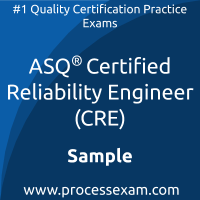01. Which of the following best describes Environmental Stress Screening (ESS)?
a) A test conducted to ensure a product meets environmental regulations.
b) A process used to screen out defective units by applying environmental stresses.
c) A method for evaluating product performance under normal operating conditions.
d) A test to determine the maximum stress a product can endure.
02. Which of the following are advantages of using Commercial Off-The-Shelf (COTS) components?
(Choose Two)
a) Reduced development time.
b) Increased customization options.
c) Lower initial cost.
d) Higher reliability compared to custom components.
03. What is the impact of high humidity on the reliability of mechanical systems?
a) Increased wear due to lubrication breakdown.
b) Enhanced performance due to moisture content.
c) Corrosion and rust formation.
d) Improved thermal conductivity.
04. When appraising the test environment, what factors should be considered to ensure an appropriate test strategy is implemented?
a) Geographic location of the test site.
b) Operational conditions such as load and stress levels.
c) Financial cost of the testing equipment.
d) Availability of skilled personnel.
05. When selecting materials and components, what is a critical factor to consider to meet reliability goals?
a) The color and design of the component.
b) The marketing potential of the component.
c) The warranty terms provided by the supplier.
d) The component's performance under expected environmental conditions.
06. What are key elements of a Failure Reporting, Analysis, and Corrective Action System (FRACAS)?
(choose three)
a) Failure data collection and reporting.
b) Failure analysis and root cause identification.
c) Corrective actions implementation and tracking.
d) Design of new product features.
07. Why is it important to identify the consequences of failure modes when establishing reliability acceptance criteria?
a) To minimize the impact on warranty costs.
b) To ensure that all possible failure modes are included in the test plan.
c) To prioritize reliability efforts based on potential impact.
d) To increase the aesthetic appeal of the product.
08. How should environmental conditions be incorporated into a test plan to ensure accurate reliability testing?
a) By simulating expected conditions during the product's operational life.
b) By only testing under optimal conditions.
c) By ignoring environmental factors that are difficult to replicate.
d) By standardizing conditions across all tests.
09. In stress-strength analysis, what does the area where the stress distribution overlaps the strength distribution represent?
a) The safety margin of the product.
b) The expected lifespan of the product.
c) The redundancy in the design.
d) The probability of failure.
10. Why is standardization important in parts selection for system development?
a) It increases the variety of parts used in production.
b) It simplifies maintenance and logistics.
c) It leads to more frequent product updates.
d) It reduces the overall system reliability.
 You have to pass the CRE exam to receive the certification from ASQ. To increase the effectiveness of your study and make you familiar with the actual exam pattern, we have prepared this ASQ Reliability Engineer sample questions. Our Sample ASQ Certified Reliability Engineer Practice Exam will give you more insight about both the type and the difficulty level of the questions on the ASQ Reliability Engineer exam.
You have to pass the CRE exam to receive the certification from ASQ. To increase the effectiveness of your study and make you familiar with the actual exam pattern, we have prepared this ASQ Reliability Engineer sample questions. Our Sample ASQ Certified Reliability Engineer Practice Exam will give you more insight about both the type and the difficulty level of the questions on the ASQ Reliability Engineer exam.